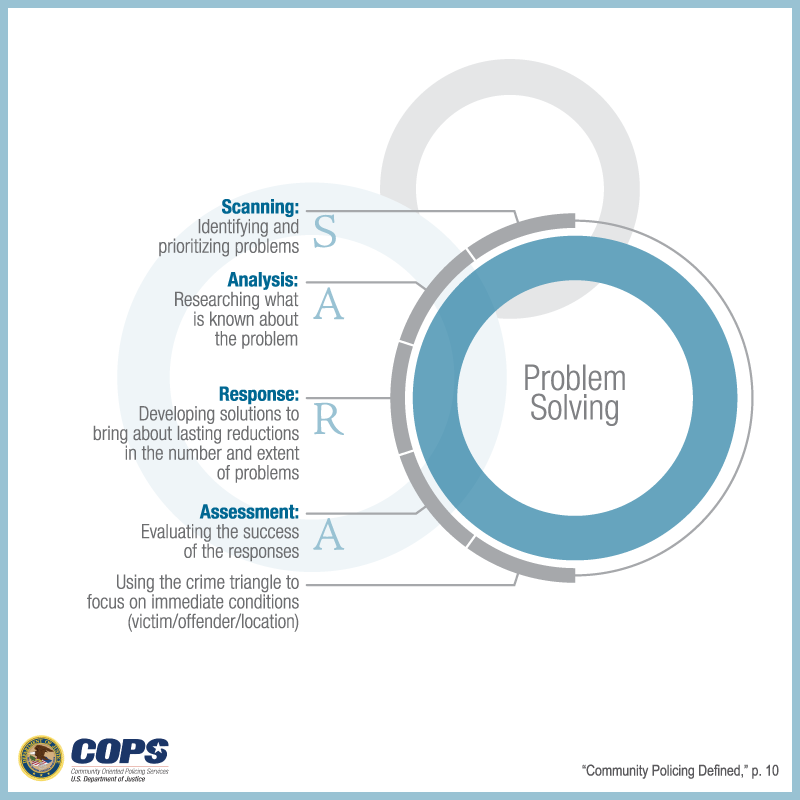Contact Us
To provide feedback on the Community Policing Dispatch, e-mail the editorial board at CPDispatch@usdoj.gov.
To obtain details on COPS Office programs, publications, and resources, contact the COPS Office Response Center at 800-421-6770 or AskCopsRC@usdoj.gov

U.S. Department of Justice
Office of Community Oriented Policing Services
Washington, DC 20530

Primary learning outcomes from the P5 program include the following:
Module 1: Introduction to a Positive School Climate
- The four elements of a positive school climate: environment, relationships, engagement and safety
Module 2. School Physical and Learning Environment
- How to change the environment to promote wellness and prevent crime
- Targeted interventions to meet students’ needs based on multi-tiered systems of support (MTSS)
- Diverse cultures (national, family, community, peer) and student worldviews
- Risk factors and strengths affecting student development and behavior
- Negative/antisocial and positive/prosocial behavior and the needs that motivate it
Module 3. Engagement and Relationships
- Understanding the adolescent brain, risk factors and protective factors influencing youth behavior
- Recognizing implicit biases to modify reactions and reduce microaggressions toward youths
Module 4. Safety and Discipline
- Addressing the entire spectrum of safety, from promotion to restoration
- De-escalation, restorative, and communication techniques to build positive relationships with students, school personnel and community
School Resource Officers (SROs) are among the most visible police in many communities and an everyday presence in the lives of their young people. As a result, the impression an SRO makes on his or her students will be an important one, not only on the teenagers as they grow into adults, but on their teachers, families, and the community at large.
Moreover, the roles of SROs can go well beyond enforcement and security to include mentoring, education, and problem solving. Through a unique training program, they can work not only in the schools, but with them, to create a healthier and more positive educational environment.
Preventing Problems by Promoting Positive Practices
Called Preventing Problems by Promoting Positive Practices (P5) and funded by the COPS Office, this new training course enables SROs, school security officers (SSOs), school police officers (SPOs), teachers, counselors, school psychologists, and administrators to collaborate in a holistic plan that can improve the school climate: environment, relationships, engagement, and safety.
Training Available Online Through the COPS Office Training Portal and in the Classroom
The training includes two parts: an introductory 60 min online course and a daylong class.
The highly interactive online course, which is available online through the COPS Office Training Portal, covers introductory concepts and recommended practices for improving the school climate and includes activities, real life scenarios, and quizzes to enhance the learning process. IADLEST certification is available for completion of this course.
There is also a daylong class which provides additional training for school administrators or other stakeholders. Taught by a team that includes a school/developmental psychologist and an SRO trainer, it is delivered at the client site. But in accordance with COVID-19 safety precautions, a virtual class is also available on a webinar platform.
Comprising four modules, the P5 course offers practical training and an action plan for addressing the critical concerns of schools, students, parents, and their communities:
- Creating safer schools and healthier students
- Improving the physical and learning environment
- Building positive relationships to engage youth
- Reforming school discipline to take a restorative justice approach
Positive Problem Solving to Address Critical Concerns
The course builds on research-based concepts and incorporates best practices for achieving participants’ school climate goals. SROs and educators use the SARA problem-solving method – Scan, Analyze, Respond, and Assess.
In addition to collaborative problem solving, SROs and educators explore their own mindsets, biases, and beliefs related to student behavior.

Learn more about the SARA model in the COPS Office publication, Community Policing Defined.
Creating Unique Partnerships for Holistic Action Plans
Says training developer Jennifer Panagopoulos, “What’s unique about this program is that it is based on collaboration, creating a partnership with a shared vision and common language, so that all stakeholders understand each other’s goals and problem solve together.”
“We have combined the education and psychology concepts that administrators, teachers, and counselors know with the law enforcement strategies that SROs know to create a shared knowledge base and process for building an action plan.”
“SROs are trained to address crime,” she notes, “but they can also promote positive behaviors and relationships. All stakeholders must learn from each other to work for common goals. P5 creates a clear way to do that.”
Collaborating to Improve School Environment and Student Lives
 Participants develop a holistic action plan at the completion of their P5 training that can include a wide variety of new practices. To build positive relationships, for instance, SROs may start eating lunch with students and teachers or mentor students after school.
Participants develop a holistic action plan at the completion of their P5 training that can include a wide variety of new practices. To build positive relationships, for instance, SROs may start eating lunch with students and teachers or mentor students after school.
To promote positive relationships, SROs can lead and support diversity and inclusion campaigns that address racism. They can also set up a tip line and a threat assessment team and be employed in promoting the tip line to students. By role-modeling inclusive behavior, and working with students to solve problems, they can make the school environment more comfortable and conducive to learning for all students.
Understanding Underlying Issues to Prevent the Bad and Promote the Good
The development of new practices through collaboration in a P5 action plan is an important goal. Equally important are the insights that the participants gain by working together, insights that can improve understanding of student culture and adolescent psychology.
Empathetic SROs become more likely to intervene on behalf of young people by helping address root causes of bad behavior rather than involving the juvenile justice system or becoming a school disciplinarian.
Training in Essential Skills for All SROs
To make a successful transition from the streets to the school hallways, law enforcement officers need to understand adolescent psychology and to be able to collaborate with and learn from teachers, counselors, and school administrators.
Practices that promote positive relationships, student strengths, and good social behavior must also be part of every SRO’s toolkit. Through P5 training on the COPS Office Training Portal and in the classroom, all officers can acquire the additional knowledge and insights they need to be valuable members of their school communities.
Faye Elkins
Sr. Technical Writer
Subscribe to Email Updates
To sign up for monthly updates or to access your subscriber preferences, please enter your email address in the Subscribe box.






